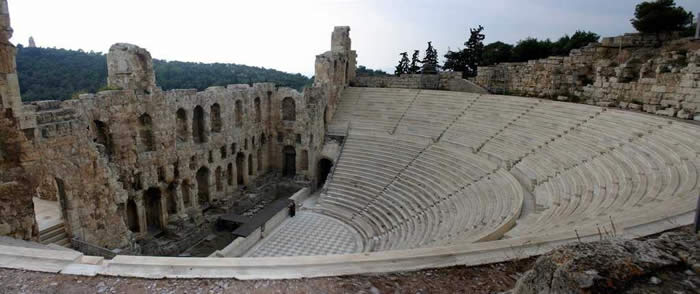
A GLORIOUS SETTING FOR MAJESTIC DRAMA

Dionysis Ampitheater
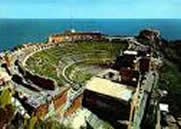 |
The theaters were outdoor auditoriums where large audiences sat upon stone benches. Starting time was daybreak. Often the citizens would sit through three tragedies, a satyr play, and a comedy. The theater was considered part of a Greek’s education, and everyone was encouraged to come. The admission charge would be refunded to playgoers who could not afford it, and they could ask to be reimbursed for the loss of a day’s wages. In Athens during drama festivals all business was suspended, the law courts were closed and prisoners were released from jail. Even women, barred from most public events, were welcomed at the theater. |
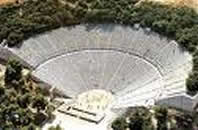 |
 |
Greek Theater Epidaurus |
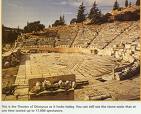 |
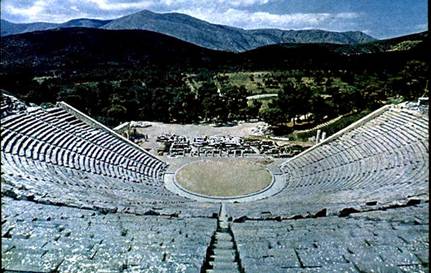 Theatre at Epidaurus Theatre at Epidaurus |
Theater and Temple of Apollo at Delphi |
Greek Theater at Dionysis |
GREEK MASKS
Mask of the God Dionysis |
Greek theaters were so large that it was hard to communicate moods and feelings to distant spectators. Masks were used that instantly identified the character as young or old, man or woman, happy or sad. Further to create a larger-than-life appearance, the actor was equipped with thick-soled boots and robes with sleeves. There were other devices: masks with calm expressions on one side and angry ones on the other, allowing the actor to change moods with one swift movement of his head; funnel-shaped mouths in the masks that acted as megaphones to protect the voice. There was a rolling device that was used to simulate indoor scenes in the outdoor theater. A derrick permitted actors playing gods to arrive on the stage direct from the heavens. It was called mechane-machine-in Greek, from which came the Latin dues ex machine, or “god from the machine,” a phrase still used to mean any artificial or miraculous event introduced into a story to help solve a plot difficulty. |
THREE FAMOUS PLAYWRIGHTS
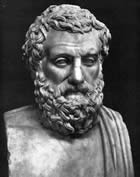 |
Tragic drama as we know it today is said to have been originated in the 6th century bc by the Athenian poet Aeschylus. Aeschylus included the role of a second actor, apart from the chorus. His tragedies, numbering about 90, treat such lofty themes as the nature of divinity and the relations of human beings to the gods. Only seven of his tragedies are extant, including Prometheus Bound, the story of the punishment of Prometheus, one of the Titans by the god Zeus; and the Oresteia, a trilogy portraying the murder of the Greek hero Agamemnon by his wife, her murder by their son Orestes, and Orestes’ subsequent fate. |
The second great Greek tragedian was Sophocles. The fine construction of his plots and the manner in which his themes and characters aroused both pity and fear led Aristotle as well as other Greek critics to consider him the greatest writer of tragedy. These qualities are found particularly in Oedipus Rex. Of the more than 100 plays that Sophocles wrote, only seven tragedies, a satyr play (a type of comedy), and more than 1000 fragments are extant. His special contribution to tragedy was the introduction of a third actor on the stage, an innovation that was adopted later by Aeschylus. |
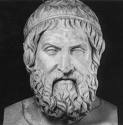 |
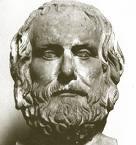 |
Euripides, a younger contemporary of Sophocles, was the third great Greek playwright. He wrote about 92 plays, of which 18 tragedies (one of doubtful authorship) and one complete satyr play, The Cyclops, are extant. Among his major works are Medea, about the revenge taken by the enchantress Medea on her husband Jason; and Hippolytus, about Phaedra’s love for her stepson Hippolytus and his fate after rejecting her. |
ORIGINS OF GREEK TRAGEDY
 |
The first “tragedies” were myths called dithyrambs which were danced and sung by a “chorus” at festivals in honor of Dionysius (God of Wine and Vegetation). At first these festivals were of a “satyric” nature (gaiety, drinking, burlesque, etc). The earliest presentations probably consisted of a chorus of men dancing in a ring, reciting or chanting some Greek myth while individual performers would stand on a rough wooden platform or cart. Spectators squatted on a hillside to view these early “plays”. Eventually, the content of the dithyramb was widened to any mythological or heroic story, and an actor was introduced to answer questions posed by the choral group. (The Greek word for actor is hypokrites, which literally means "answerer." It is the source for our English word "hypocrite.") Tragedy was recognized as an official state cult in Athens in 534 BC. |
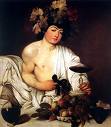 |
As time passed the sung and danced myths developed a more serious form. Instead of gaiety and burlesque the “plays” now dealt with the relationship of man and the “Gods”, and tried to illustrate some particular lesson of life. The chorus dressed in goat skins because the goat was sacred to Dionysius and goats were “prizes” which were awarded for the best plays. Therefore, the word tragedy is believed to be derived from the Greek word “tragoidia” which means “goat-song”. As time passed the sung and danced myths developed a more serious form. Instead of gaiety and burlesque the “plays” now dealt with the relationship of man and the “Gods”, and tried to illustrate some particular lesson of life. The chorus dressed in goat skins because the goat was sacred to Dionysius and goats were “prizes” which were awarded for the best plays. Therefore, the word tragedy is believed to be derived from the Greek word “tragoidia” which means “goat-song”. |
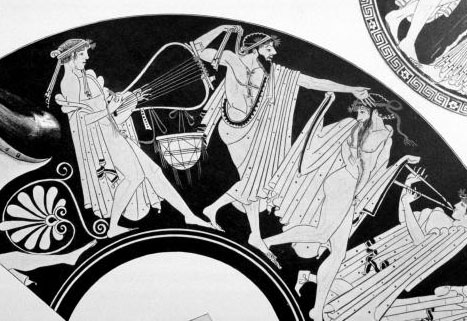 |
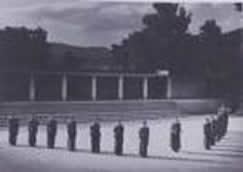 |
In the open-air, day-lit Greek theatre, the chorus was a practical necessity. It made the transitions between scenes, giving actors the chance to enter and leave the playing area, and even announced what characters those actors portrayed. But the function of the chorus goes beyond this. The choral odes, accompanied by dancing and music, were part of the entertainment itself. The chorus both commented on the events and participated in them, so that it was both involved in the action and detached from it. It was in 534 B.C. that perhaps the most important stage in the creation of drama was reached with Thespis, who invented an actor who conversed with the leader of the chorus, and by his reports of events occurring off the stage could provide the chorus with materials for fresh songs in new scenes. Through the addition of a second actor (by Aeschylus) and a third (by Sophocles), the representation was made possible of a drama which could show and develop a human situation in all its aspects. |
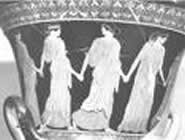 |
This year we will be reading two plays by Sophocles: Oedipus Rex and Antigone